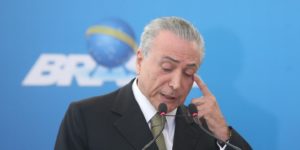As Corruption Engulfs Brazil’s “Interim” President, Mask Has Fallen Off Protest Movement
BRICS, 20 Jun 2016
Glenn Greenwald – The Intercept
 Para ler o versão desse artigo em Português, Clique Aqui.
Para ler o versão desse artigo em Português, Clique Aqui.
(updated below)
16 Jun 2016 – Momentum for the impeachment of Brazil’s democratically elected president, Dilma Rousseff, was initially driven by large, flamboyant street protests of citizens demanding her removal. Although Brazil’s dominant media endlessly glorified (and incited) these green-and-yellow-clad protests as an organic citizen movement, evidence recently emerged that protests groups were covertly funded by opposition parties. Still, there is no doubt that millions of Brazilians participated in marches demanding Rousseff’s ouster, claiming they were motivated by anger over her and her party’s corruption.
But from the start, there were all sorts of reasons to doubt this storyline and to see that these protesters were (for the most part) not opposed to corruption, but simply devoted to removing from power the center-left party that won four straight national elections. As international media outlets reported, data showed that the protesters were not representative of Brazilian society but rather were disproportionately white and rich: In other words, the same people who have long hated and voted against PT. As The Guardian put it in its description of the largest Rio protest: “The crowd was predominantly white, middle class and predisposed to supporting the opposition.” To be sure, many former PT supporters turned against Dilma — with good reason — and PT itself has indeed been rife with corruption. But the protests were largely composed of the same factions who have long opposed PT.
 That’s why a photo — of a wealthy, white family at an anti-Dilma protest trailed by their black weekend nanny decked in the all-white uniform many rich Brazilians make their domestic servants wear — went viral: because it captured what these protests were. And while these protests rightly denounced the corruption scandals inside PT — and there are many — they largely ignored the right-wing politicians drowning in far worse corruption scandals than Dilma.
That’s why a photo — of a wealthy, white family at an anti-Dilma protest trailed by their black weekend nanny decked in the all-white uniform many rich Brazilians make their domestic servants wear — went viral: because it captured what these protests were. And while these protests rightly denounced the corruption scandals inside PT — and there are many — they largely ignored the right-wing politicians drowning in far worse corruption scandals than Dilma.
Plainly, these were not anti-corruption marches but rather anti-democracy marches: conducted by people whose political views are a minority and whose preferred politicians lose when elections determine who leads Brazil. And, as intended, the new government is now attempting to impose an agenda of austerity and privatization that would never be ratified if the population had any say (Dilma herself imposed austerity measures after her 2014 re-election, after running on a campaign against them).
After yesterday’s huge news from Brazil, the evidence that these protests were a sham is now overwhelming. An oil executive and ex-senator from the conservative opposition party PSDB, Sérgio Machado, testified as part of his plea bargain that Michel Temer — Brazil’s “interim” president who conspired to get rid of Dilma — demanded 1.5 million reals in illegal kickbacks for the São Paulo mayoral campaign of his party’s candidate (Temer denies this). This comes on top of multiple other corruption scandals in which Temer is implicated, as well as a court-imposed eight-year ban on his running for any office (including the one he now occupies) due to violations of campaign spending laws.
And that’s all independent of how two of Temer’s new ministers were forced to resign after recordings revealed they were conspiring to kill the corruption investigation in which they are targets, including one who was Temer’s anti-corruption minister and another — Romero Jucá, one of Temer’s closest allies in Brasília — who now has been accused by Machado of receiving many millions in bribes. In sum, the person whom Brazilian elites — in the name of “anti-corruption” — installed to replace the democratically elected president is choking on multiple, overwhelming scandals of corruption.
But yesterday’s bombshell extended far beyond Temer, engulfing numerous other politicians who have been leading the impeachment charge against Dilma. Perhaps most significant is Aécio Neves, the center-right PSDB candidate whom Dilma defeated in 2014 and who, as a senator, is a leading advocate of her impeachment. Machado testified that Aécio — who also had been previously implicated in the corruption scandal — received and controlled 1 million reals in illegal campaign donations. To describe Aécio as central to the protesters’ worldview is an understatement. For over a year, they popularized the phrase “It’s not my fault: I voted for Aécio”; they even made T-shirts and bumper stickers proudly proclaiming this:
Evidence of pervasive corruption among Brazil’s political class — not only PT but far beyond it — continues to emerge, now engulfing those who undemocratically seized power in the name of combating it. But ever since the lower House vote on Dilma’s impeachment, the protest movement has disappeared. For some reason, the “Vem Pra Rua” (come to the streets) contingent is not out in the streets demanding Temer’s impeachment, or Aécio’s removal, or Jucá’s imprisonment. Why is that? Where have they gone?
One searches their website and Facebook pages in vain for any denunciation, let alone protest organizing, aimed at the deep, pervasive corruption of the “interim” government or any of the numerous politicians not on the left. They are still promoting what they hope will be a massive march on July 31, but that centers around Dilma’s impeachment, not Temer or any opposition leaders who have proven to be deeply corrupt. Their purported anger over corruption seems to begin — and end — with Dilma and PT.
In this regard, this protest movement is indeed representative of impeachment itself: It used corruption as the pretext for the anti-democratic end it sought to achieve. Whatever else is true, any process that results in the empowerment of people like Michel Temer, Romero Jucá, and Aécio Neves had many goals; anti-corruption was never one of them.
* * * *
Last month, Brazil’s first Pulitzer Prize winner, the photojournalist Mauricio Lima, denounced impeachment as a “coup” with the Globo TV network at its center. Last night, as a guest on Chelsea Handler’s Netflix show, Wagner Moura, arguably Brazil’s most popular actor, denounced it in similar terms, saying that domestic media coverage has been “extremely limited” because the Brazilian media “is owned by five families.”
UPDATE: Shortly after this article was published, it was announced that “interim” President Temer just lost his third minister to corruption in less than two months since he seized power: this time, this Tourism Minister Henrique Eduardo Alves, accused in Machado’s plea statement of receiving R$ 1.5 million in kickbacks from 2008 to 2014. If you’re going to take power undemocratically and use “corruption” as the pretext, it’s generally a bad idea to fill your new cabinet with criminals (and, for that matter, for the new president himself to be implicated in multiple layers of corruption).
_______________________________________
Glenn Greenwald – ✉glenn.greenwald@theintercept.com
Go to Original – theintercept.com
DISCLAIMER: The statements, views and opinions expressed in pieces republished here are solely those of the authors and do not necessarily represent those of TMS. In accordance with title 17 U.S.C. section 107, this material is distributed without profit to those who have expressed a prior interest in receiving the included information for research and educational purposes. TMS has no affiliation whatsoever with the originator of this article nor is TMS endorsed or sponsored by the originator. “GO TO ORIGINAL” links are provided as a convenience to our readers and allow for verification of authenticity. However, as originating pages are often updated by their originating host sites, the versions posted may not match the versions our readers view when clicking the “GO TO ORIGINAL” links. This site contains copyrighted material the use of which has not always been specifically authorized by the copyright owner. We are making such material available in our efforts to advance understanding of environmental, political, human rights, economic, democracy, scientific, and social justice issues, etc. We believe this constitutes a ‘fair use’ of any such copyrighted material as provided for in section 107 of the US Copyright Law. In accordance with Title 17 U.S.C. Section 107, the material on this site is distributed without profit to those who have expressed a prior interest in receiving the included information for research and educational purposes. For more information go to: http://www.law.cornell.edu/uscode/17/107.shtml. If you wish to use copyrighted material from this site for purposes of your own that go beyond ‘fair use’, you must obtain permission from the copyright owner.

